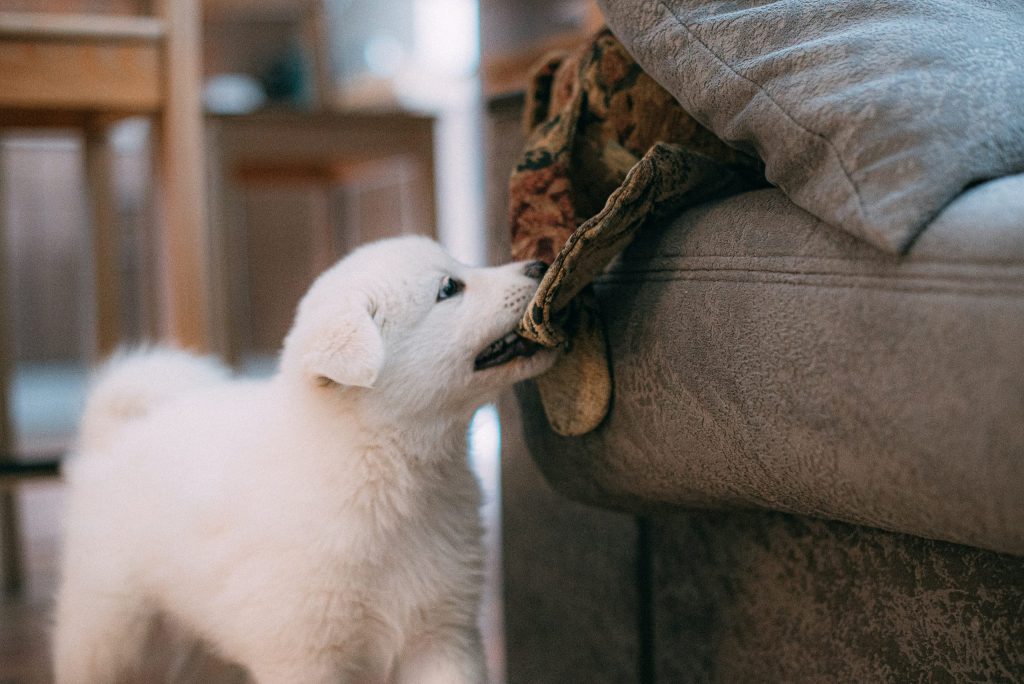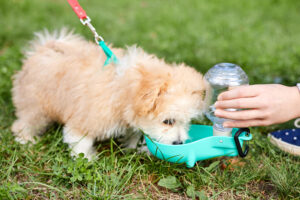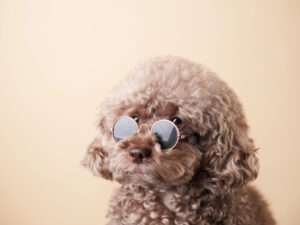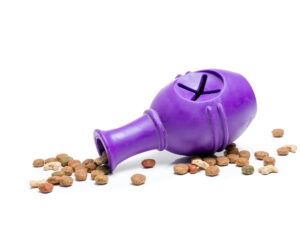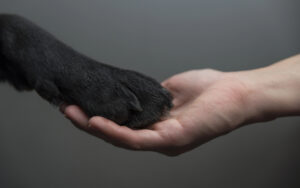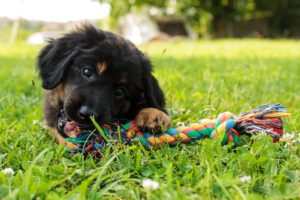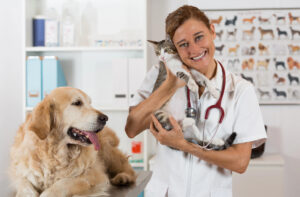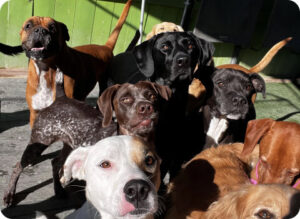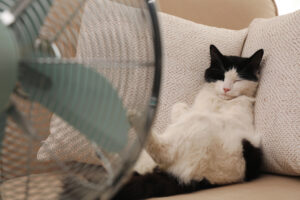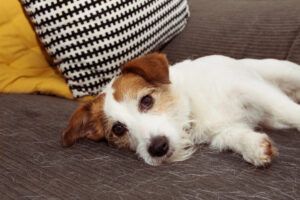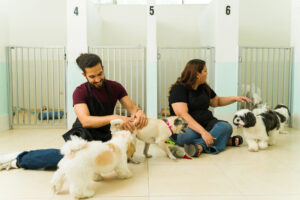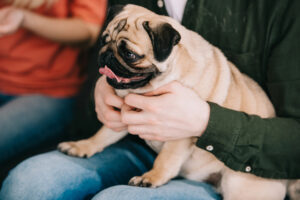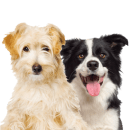Oh, puppies. Those adorable little wet noses and cute wagging tails. And oh yeah, those razor-sharp teeth! Dogs’ baby teeth might be tiny, but they’re surprisingly strong. Puppies tend to explore the world through their mouths, tasting everything that comes their way (whether or not it’s edible) and playing with those little jaws wide open. While a little nip here and there from a puppy might not sound like a big deal, don’t forget that little puppy is going to grow up to be an adult dog. For your safety and for others, you do not want a dog that bites. What can you do to train your puppy to stop biting?
Biting is what puppies are used to; it’s how they play with their littermates and other puppies. However, you have human hands and feet, curtains, pant legs, and more, and you don’t want your puppy biting any of it.
Teething & Why Puppies Bite
Teething is a huge part of why puppies love to bite and chew. Like human babies, chewing soothes their discomfort. Once they’re around six months old, all their puppy teeth should be replaced by adult teeth. This will likely help reduce some of their biting, but it’ll still be important to train your puppy to stop biting. Just because your pup leaves his teething phase, it doesn’t mean he’ll also suddenly know that he shouldn’t play bite or chew on furniture.
You should also keep in mind that dogs and puppies usually use their mouths rather than their paws to manipulate objects and explore their surroundings. Puppies may also bite in order to get your attention or to release their energy if they’re not exercised enough.
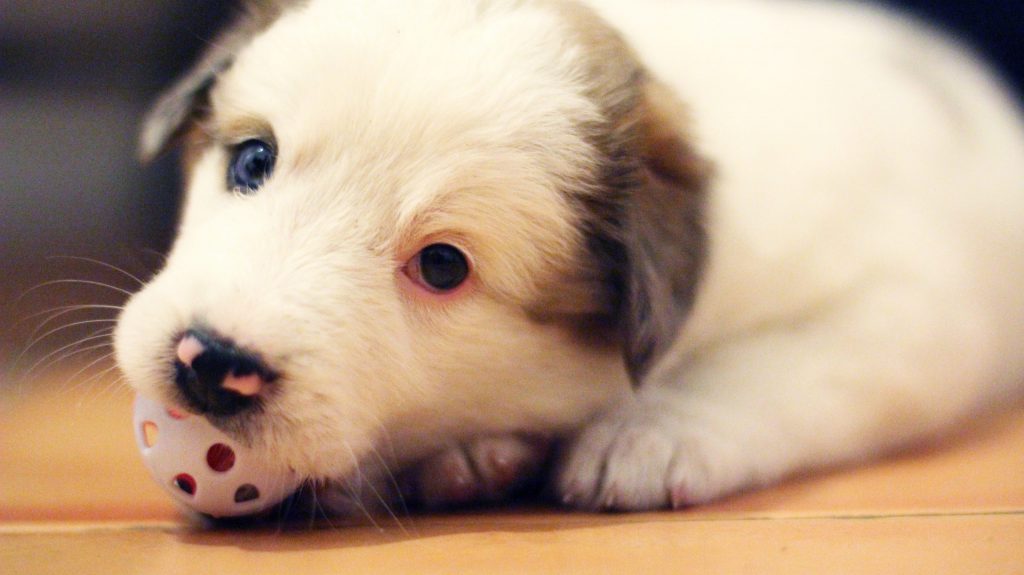
Tips to Train Your Puppy to Stop Biting
Bite Inhibition
Bite inhibition refers to a dog’s ability to control how hard he bites. Puppies usually learn how to control this by playing with other puppies. When puppies play, they bit each other all over, but if one of them bites too hard, his playmate will let out a yelp and stop playing. This startles the biting puppy and he’ll usually stop playing as well out of confusion. However, after this interaction, the puppies usually get back to playing and the puppy that bit the other will have a better understanding of how to play gently to avoid interruption.
This is the same lesson that you’ll be teaching your puppy. While playing, let your puppy bite your hands. When he bites too hard, yelp and let your hand go limp. This should cause him to stop playing for a moment. If he doesn’t stop playing, trying saying something in a stern voice to get his attention. If your puppy stops or if he licks you, praise his behavior and get back to playing, continuing this process. Don’t repeat this more than 3 times in a 15 minutes period, though.
If you don’t feel that yelping alone is enough to teach your puppy to be gentler when playing, you can also include a time out. Repeat the process of yelping and letting your hand go limp, but when your puppy stops playing and looks around, pull your hand away and ignore him for 10-20 seconds. After ignoring him for a bit, go back to him and encourage him to play with you again.
Your goal in using these methods is to teach your puppy that gentle play will go uninterrupted, but rough play means that playtime ends. Once he becomes more gentle, you can continue this process to train him to become even gentler. You want to train him so you feel little to no force when he bites you while playing.
Deterrence
In order to deter biting, you can try using a spray product to train your puppy to stop biting. There are a variety of sprays available that will make the objects your puppy loves to chew taste bad.
However, you can’t just spray your furniture or other items with the spray and let your dog chew. You should associate the smell of the spray with the taste so that eventually your dog will stay away from your furniture when he so much as smells the spray.
You can do this by spraying a tissue or cotton ball with the spray and letting your dog lick it. Once he spits it out, let him smell it so that he’ll associate the smell with the taste that he didn’t like.
You may also want to take your dog’s water bowl away for a short period of time after you see him chew on something that’s been sprayed so that he doesn’t learn that he can wash the taste out of his mouth immediately after biting. This will allow the taste to linger, letting him know that the taste is a consequence of biting. Don’t withhold water for a long period of time, though, just long enough that he understands the taste won’t go away right away. In addition to this, you shouldn’t need to use the spray forever. Within 2 to 4 weeks, your dog’s chewing on objects should be deterred. If it isn’t, you may want to contact a professional.
Redirection
Another option to train your puppy to stop biting is to redirect his attention. This method will teach him that it’s inappropriate to bite human skin. Before your puppy tries to bite or mouth your hand, pull it away. After doing this, provide him with a treat or a toy that’s safe for him to chew.
Playing non-contact games with your puppy may also help distract him from biting. Games like fetch or tug-of-war are great options for this. Just avoid letting his tugging become too aggressive. “Let go” or “leave it” are also good commands to teach so that you can easily remove things from your puppy’s mouth without being bitten.
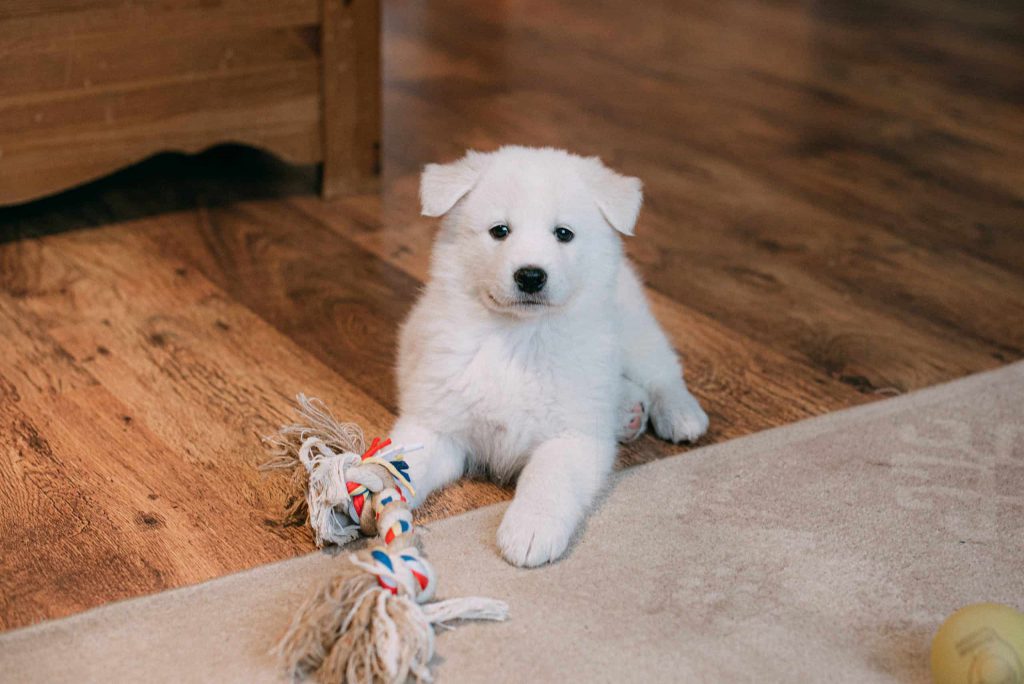
Distraction
Puppies don’t just bite people, they also bite the objects around them. This is mostly a result of puppies using their mouths to explore their surroundings. This is why you’ll want to puppy-proof your home before your new puppy gets there. In addition to this, you can also provide plenty of chew-safe toys in order to use distraction to train your puppy to stop biting.
Just remember to choose toys based on your puppy’s level of destructiveness. For example, particularly destructive puppies will likely need sturdy rubber or plastic toys.
Hide-the-treat toys are also a great option for distraction because they’ll distract your puppy for a long time and provide mental stimulation.
Once your puppy’s vaccinated, scheduling playdates with other vaccinated puppies and dogs will also help him learn to control his biting while distracting him from your furniture. Playdates are also great for socializing.
What to Avoid
Now that you know what to do to train your puppy to stop biting, here’s what you should avoid.
Don’t play with your puppy by waving your fingers or toes around, because this will encourage him to bite your hands and feet. He’ll think of them as toys and it’ll only increase his desire to play bite.
You also don’t want to discourage your puppy from playing with you in order to avoid play biting. Play creates a bond between you and your puppy, so just teach him to play gently.
Avoid jerking your hands or feet away from him when he bites or mouths. Doing this will lead to him jumping forward or trying to grab at you. It’s best to let your hands or feet go limp to make him lose interest in them.
Don’t hit your puppy in response to play biting. Not only may this make him afraid of you, but it may also cause him to bite harder or become more aggressive. Avoid any punishment that might hurt or scare your puppy.
Train Your Puppy to Stop Biting With Help From Fon Jon Pet Care!
Although all of the above methods are great ways to train your puppy to stop biting, there’s a difference between a puppy temper tantrum and simple play biting. This type of biting is usually caused by fear or frustration and is much more serious than play biting.
You can tell the difference between these two kinds of biting in your puppy’s face. When play biting, his face and body will likely be relaxed and there won’t be too much tension in his facial muscles. During a temper tantrum, your puppy’s body will look stiff or frozen, his lips pulled back to expose his teeth, and he may even growl. Temper tantrum bites will also be more painful than play bites or mouthing.
If your puppy is throwing temper tantrums and biting out of fear or frustration, it’s time to call a professional. Puppies won’t simply grow out of temper tantrum biting, so this will require professional assessment and a plan for resolution. If you can’t tell whether your puppy’s mouthing is normal, a professional will help you figure that out as well.
For help with biting or any aspect of puppy training, the professionals at Fon Jon Pet Care are more than happy to help. Call us at 858-753-9892 to learn more about our dog and puppy training courses.




